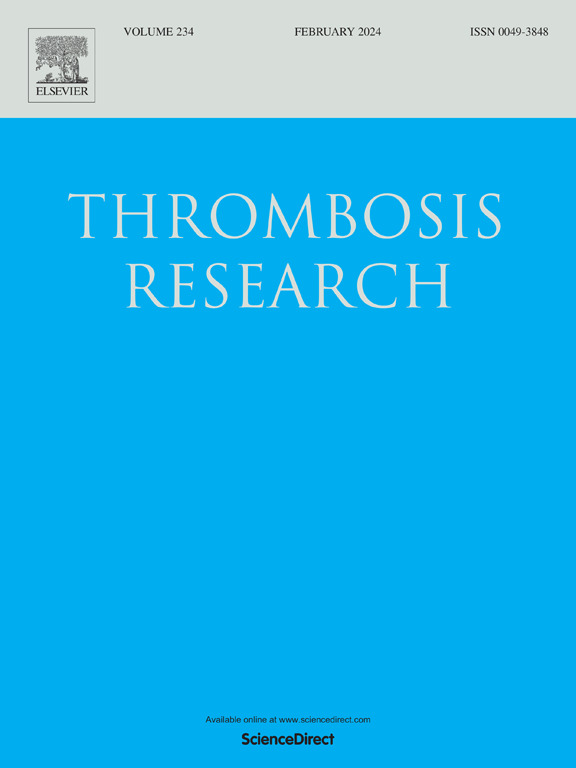白细胞介素-10基因变异在血友病抑制剂发展中的作用:一项荟萃分析
IF 3.4
3区 医学
Q1 HEMATOLOGY
引用次数: 0
摘要
血友病治疗的一个主要挑战是开发抑制剂来中和替代疗法。白细胞介素-10 (IL-10)是一种抗炎细胞因子,调节免疫反应并影响抗体的产生,提示在抑制剂形成中起潜在作用。目的探讨血友病患者IL-10多态性与抑制剂形成的关系。方法遵循PRISMA指南,该研究在PROSPERO注册(CRD42024590045)。IL-10多态性和抑制剂的遗传研究被纳入,而病例报告、综述和动物研究被排除在外。在PubMed和Scielo中进行了全面的搜索,涵盖了截至2025年1月27日的记录。使用Q-genie评估方法学质量,并使用Mantel-Haenszel方法对至少三个研究的数据进行多态性荟萃分析。结果在105项筛选研究中,19项纳入系统评价,12项纳入荟萃分析。IL-10多态性(rs1800896、rs1800871、rs1800872)与抑制剂形成无显著相关性。在亚组分析中,T-rs1800871和a -rs1800872隐性模型与严重血友病a患者的抑制剂发展保护相关。结论这些发现表明IL-10可能在抑制剂形成的遗传易感性中没有核心作用。然而,在严重血友病A亚组中观察到的显著相关性强调了进一步研究IL-10在免疫耐受中的作用的必要性。本文章由计算机程序翻译,如有差异,请以英文原文为准。
The role of interleukin-10 gene variants in inhibitor development in hemophilia: A meta-analysis
Background
A major therapeutic challenge in hemophilia is the development of inhibitors that neutralize replacement therapies. Interleukin-10 (IL-10), an anti-inflammatory cytokine, regulates immune responses and influences antibody production, suggesting a potential role in inhibitor formation.
Objectives
This systematic review aimed to investigate the association of IL-10 polymorphism with inhibitor formation in patients with hemophilia.
Methods
Following PRISMA guidelines, the study was registered in PROSPERO (CRD42024590045). Genetic studies on IL-10 polymorphisms and inhibitors were included, while case reports, reviews, and animal studies were excluded. A comprehensive search was conducted in PubMed and Scielo, covering records up to January 27, 2025. Methodological quality was assessed using Q-genie, and a meta-analysis was performed for polymorphisms with data from at least three studies, using the Mantel-Haenszel method.
Results
Of 105 screened studies, 19 were included in the systematic review and 12 in the meta-analysis. No significant association was found between IL-10 polymorphisms (rs1800896, rs1800871, rs1800872) and inhibitor formation. In a subgroup analysis, the T-rs1800871 and A-rs1800872 recessive models were associated with protection against inhibitor development in subjects with severe hemophilia A.
Conclusion
These findings suggest that IL-10 may not have a central role in the genetic predisposition to inhibitor formation. However, the significant association observed in the severe hemophilia A subgroup emphasizes the need for further investigation into the role of IL-10 in immune tolerance.
求助全文
通过发布文献求助,成功后即可免费获取论文全文。
去求助
来源期刊

Thrombosis research
医学-外周血管病
CiteScore
14.60
自引率
4.00%
发文量
364
审稿时长
31 days
期刊介绍:
Thrombosis Research is an international journal dedicated to the swift dissemination of new information on thrombosis, hemostasis, and vascular biology, aimed at advancing both science and clinical care. The journal publishes peer-reviewed original research, reviews, editorials, opinions, and critiques, covering both basic and clinical studies. Priority is given to research that promises novel approaches in the diagnosis, therapy, prognosis, and prevention of thrombotic and hemorrhagic diseases.
 求助内容:
求助内容: 应助结果提醒方式:
应助结果提醒方式:


